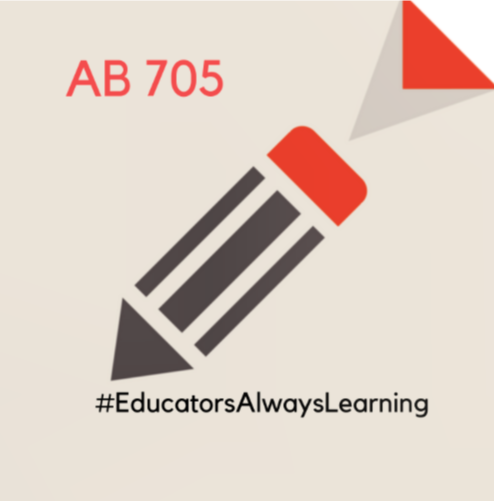As a college advisor, I’m always learning from my students, college campus staff, and fellow colleagues. So it came as a welcomed surprise when I stumbled across student-made signs in support of Assembly Bill 705 at City College of San Francisco (CCSF) over the summer. During an on campus visit to CCSF, there were signs all over reading “Know your rights. AB 705!” and “Support AB 705. Transfer Quicker. No more remedial classes.” As a college advisor who hadn’t heard about the bill, I was confused and didn’t know if this was legitimate. After speaking to a staff member in the library, she mentioned that AB 705 will essentially allow California community college students automatically place into college-level math and English rather than having to take a long sequence of remedial classes prior. A bill signed by Governor Brown, AB 705 took effect on January 1st, 2018 and requires that community colleges to give students the option to place into college-level math and English courses while taking into consideration their high school grades. I was thrilled to hear this news initially because it meant that students will have the opportunity to transfer quicker and not burn out from being in community college longer than they need to be.
From my experience at a college advisor, many of my community college students have felt discouraged to persist in school because of the lower level math and English classes they place into in their first year. These remedial classes are intended to prepare students for the college-level math and English classes but are required to take these lower level classes without receiving any college credit. Student performance on the placement exam will indicate which level of math and English they are required to take, and if they place below the college level for either subject, they will have a sequence of remedial courses to take before reaching college-level math and English. This can usually prevent a student from enrolling in other classes that have a math or English prerequisite therefore lengthening the time it takes for him or her to transfer or graduate. “California’s community colleges identify more than 75 percent of its students as underprepared, and refer this overwhelming majority of students to remedial courses.” Students soon realize that having to take one to three or more remedial classes for both math and English is not worth being in community college for 3+ years. Some who attempt the remedial sequence experience burnout, which prevents them from staying motivated because “this can add years to their course load and reduces their chances of completing college.” A common myth is that students assume that they are at community college for two years and that’s it, but in reality, it’s about the units accrued rather than the time spent on campus in order to transfer or graduate.
AB 705 allows community college students an equal opportunity to transfer without being “disproportionately placed into remedial classes.” This bill directly addresses one of the most ongoing and pertinent issues for community college students, which is the amount of time it takes to transfer. The Campaign for College Opportunity mentions that “93% of students don’t make it out of remedial math” and “49% graduate from the California Community College System after 6 years.” It’s easy to see why students are discouraged from continuing after being in remedial classes for so long and find it difficult to see the light at the end of the tunnel. With the passing of AB 705, “no student can be denied entry into a transfer-level math or English course.” Colleges will now use a student’s high school coursework, grades and GPA to determine the support she or he will need in their college-level math and English classes in hopes of motivating students to persist in college and graduate and/or transfer.
It’s amazing to know that our students are being heard and used their platform to change the course of their academic careers. Now more than ever, these institutions are responsible for making sure that the students will be supported in these college-level courses. This means holding campuses accountable for effective tutoring services, professors hosting office hours weekly, and college counselors making ourselves available for questioning. We also have to encourage our students to seek out these resources they have access to and pay for in their tuition. This is going to be a learning process for all parties involved, but being educated on this new bill and talking and partnering with community colleges is the best way to prepare our students as they are entering their college-level math and English courses.
Ashley Terry
Latest posts by Ashley Terry (see all)
- El Entorno de la Escuela es Suya: Cómo Hice el Transición de la Escuela Secundaria a la Escuela Preparatoria - November 1, 2019
- Your School Environment is Yours: How I Made the Transition from Middle to High School - October 30, 2019
- Lo que Estudiantes y Padres Deben Saber Sobre la Transición de la Escuela Preparatoria a la Universidad - May 23, 2019
- What Students and Parents Need to Know About the Transition from High School to College - May 16, 2019
- #EducadoresSiempreAprendiendo: Cómo AB 705 Ayuda a los Estudiantes a Evitar Cursos de Recuperación Redundantes - January 4, 2019

